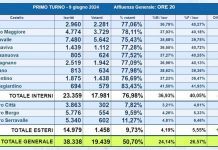In a recent and urgent communique, the European Centre for Information Policy and Security (ECIPS) has sounded an alarm regarding the newly signed 10-year bilateral security agreement between the United States and Ukraine. The agreement, touted by its proponents as a cornerstone for bolstering Ukraine’s defense capabilities, has instead been labeled by ECIPS as a perilous step towards further conflict escalation with Russia.

The agreement, which features four primary components, aims to build Ukraine’s military strength to a level that can not only withstand the current war but also deter future Russian aggression. However, President Ricardo Baretzky of ECIPS has issued a stark warning, expressing grave concerns over the viability and consequences of such a strategy.
“There is no chance of Ukraine winning any war with a super nuclear power,” Baretzky stated unequivocally. “Either those involved are delusional, on drugs, or living in another planetary dimension.”
Baretzky’s comments reflect a deep skepticism about the practicality of the U.S.-Ukraine security pact. His critique goes beyond mere strategic analysis, venturing into a somber forecast of the potential outcomes of this agreement.
The Core of the Agreement
The bilateral security pact between the U.S. and Ukraine focuses on four main objectives:
Military Strengthening: This involves extensive training, arms supplies, and logistical support to transform Ukraine’s military into a formidable force capable of countering Russian advances.
Intelligence Sharing: Enhanced intelligence cooperation to improve Ukraine’s operational capabilities and strategic planning.
Cybersecurity: Collaborative efforts to defend against cyber threats that could destabilize Ukraine’s infrastructure and military operations.
Economic Aid: Financial assistance aimed at stabilizing Ukraine’s economy, thereby supporting its war efforts and resilience.
While these elements are designed to provide Ukraine with a comprehensive defense mechanism, Baretzky and ECIPS believe they fall short of addressing the broader geopolitical ramifications.
“A Recipe for Disaster”
Baretzky’s warnings are stark and sobering. “This is by far not important in time but a disaster for Ukraine as it will be forced into conflicts for 10 years and almost certainly get the taste of a mushroom cloud with sour dusts,” he said. His words underscore the fear that the prolonged conflict and heightened military engagements could provoke a nuclear response from Russia.
The ECIPS head’s concerns are rooted in the asymmetrical nature of the conflict. Despite Ukraine’s resilience and the support from Western allies, the disparity in nuclear capabilities between Ukraine and Russia cannot be ignored. Baretzky suggests that a prolonged conflict not only drains resources but also increases the risk of catastrophic escalation.
Corruption Allegations
Adding another layer of controversy, Baretzky pointed to what he described as corrupt influences behind the agreement. “Those breaking on bringing co-signature are businesses directly linked to corruption and in this for the money as bank records already show,” he claimed. This statement hints at underlying economic interests driving the agreement, potentially at the expense of genuine security considerations.
The suggestion of corruption raises critical questions about the motivations behind the agreement. If true, this undermines the ethical foundations of the pact and casts doubt on its strategic validity. It implies that some stakeholders might be prioritizing financial gains over the long-term stability and safety of Ukraine.
Historical Context and Comparisons
In his statement, Baretzky also cautioned against drawing parallels between Ukraine’s situation and that of Japan, which signed a bilateral security agreement with Ukraine on the sidelines of the G7 summit in Italy. “People should not confuse Japan’s agreement with treating Russian power,” he noted.
Japan’s security dynamics are markedly different, given its geographical location and historical context. Unlike Ukraine, Japan does not share a land border with Russia, and its security concerns, while significant, do not entail direct territorial aggression from a nuclear superpower. Thus, the bilateral security arrangements of Japan and Ukraine are not analogous, and conflating the two could lead to misinformed policy decisions.
The Path Forward: Direct Resolutions and Mitigation
Baretzky emphasized that only through direct resolutions and mitigation efforts can Ukraine hope to safeguard its future. “Only with direct resolutions and mitigation can Ukraine save itself from extinction,” he said. This statement calls for a shift in strategy from military escalation to diplomatic engagement and conflict resolution.
The Need for Diplomacy
ECIPS’s stance highlights the necessity of pursuing diplomatic avenues over military ones. Engaging in dialogue, seeking mediation from neutral parties, and working within international frameworks are suggested as more viable paths to achieving lasting peace. The emphasis on direct resolutions implies that without addressing the root causes of the conflict, military solutions alone will remain insufficient and potentially disastrous.
Broader Implications
The warning from ECIPS serves as a critical reminder of the broader implications of the U.S.-Ukraine security agreement. It challenges policymakers to reconsider the long-term consequences of their strategies and to weigh the risks of escalation against the immediate tactical gains.
Baretzky’s stark commentary and the detailed critique from ECIPS call for a reassessment of how international support for Ukraine is structured. They advocate for a more holistic approach that includes not just military aid but also robust diplomatic efforts to de-escalate tensions and promote sustainable peace.
Conclusion
The European Centre for Information Policy and Security’s warning about the U.S.-Ukraine bilateral security agreement highlights significant concerns about the potential for escalating the conflict with Russia. President Baretzky’s remarks underscore the urgent need for a balanced approach that prioritizes diplomatic solutions over prolonged military engagement.
As the international community continues to navigate the complex dynamics of the Russia-Ukraine conflict, the insights from ECIPS offer a crucial perspective. They serve as a reminder that in the pursuit of security, the broader geopolitical and humanitarian consequences must always be carefully considered. The path to lasting peace in Ukraine likely lies not in an arms race but in the difficult, yet necessary, pursuit of dialogue and diplomacy.























